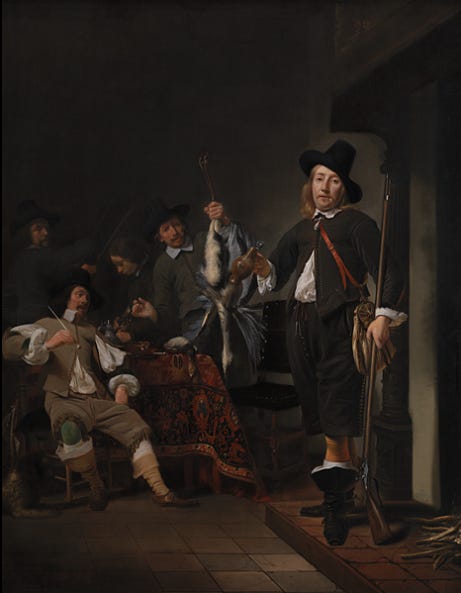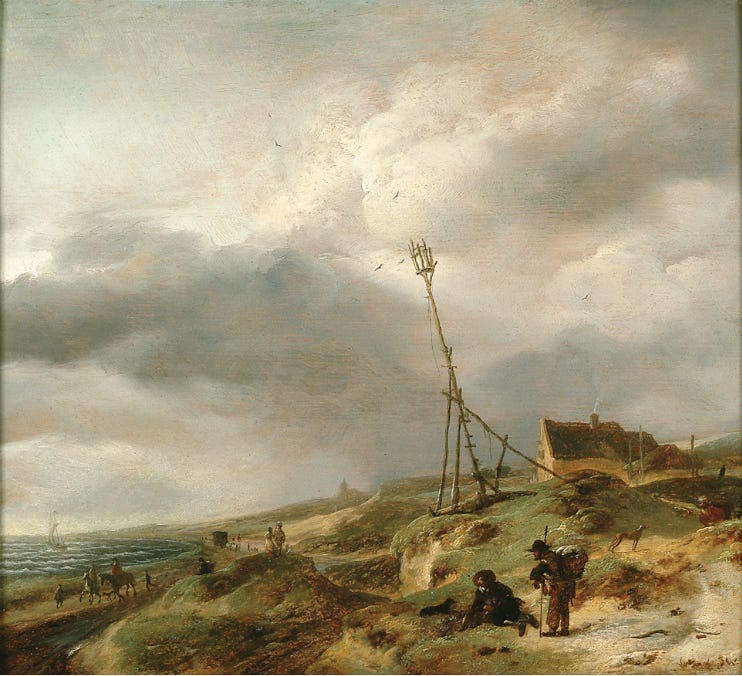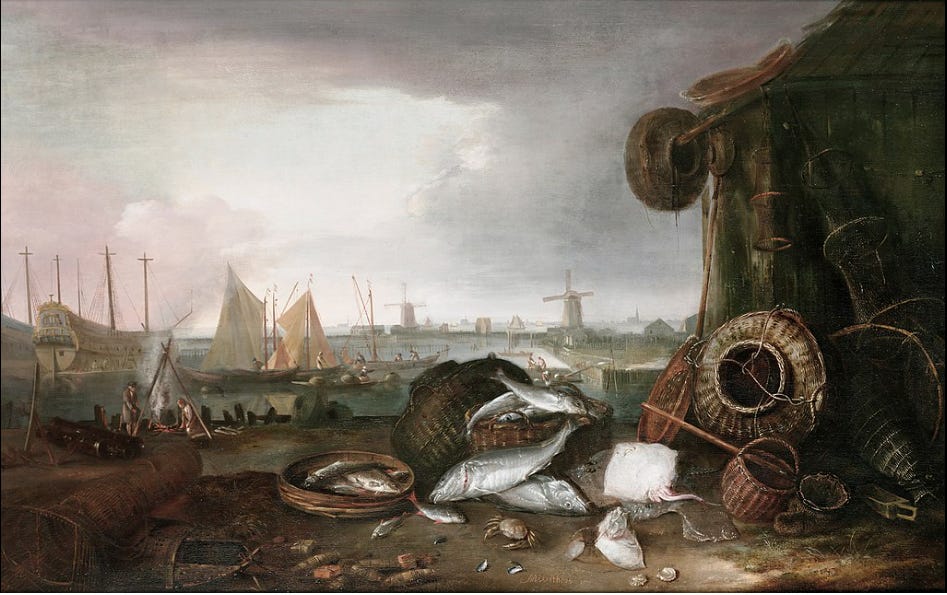Treasure hunt!
Pepys Show: November 1662
And after some pleasant discourse and supper to bed, and in my dream much troubled by being with Will. Swan, a great fanatic, my old acquaintance, and, methought, taken and led up with him for a plotter, all our discourse being at present about the late plots.
Samuel Pepys is on a treasure hunt! On Halloween 1662 he was told of a rumour that John Barkstead—a goldsmith who sided with the losing parliamentarians in the civil war—buried seven thousand pounds worth of gold at the Tower of London, and now Lord Sandwich has commissioned Pepys to find it. Thomas Wade has labourers and an “intelligencer” who’d brought him the story, and on November first they spend three hours digging under all the arches—only to come up empty handed. They go to meet Captain Evett at the Dolphin, who swears he has this from Barkestead’s own mouth, and that the original plan was to get it out before King Charles II’s restoration. Pepys is convinced the story is true, but fears that Barkestead might have found, “some conveyance of it away, without the help of this man, before he died.”
Pepys meets the “prime intelligencer” on the third, a woman who convinces him to keep digging. “So we resolved to set upon it again on Wednesday morning; and the woman herself will be there in a disguise, and confirm us in the place.” I have no idea why she would need a disguise, but it sounds fun.
A third attempt at the tower is made on the seventh, with the woman swearing there’s fifty thousand pounds hidden in buried butter firkins, and that Barkestead realized he’d never get it back, so told her how to recover it. They dig all night, taking a break to have dinner served on a barrel and Mr. Lee entertaining them with stories of Spanish customs. Still, there’s no gold, and they have to give up and pay their porters. Pepys figures the gold must be here somewhere… unless it was a story Barkestead told the woman hoping to oblige her to further serve him, which Pepys is now “apt to believe.”
Pepys meets up with them again at the Dolphin on the twelfth, and is sure, “there is no cheat in these people,” but while he resolves to try again, no further attempt is made. Funnily enough, though, he’s back at the Tower on the twenty-fourth hoping to see treasure from a different source—the first French payment for Dunkirk has come in. Pepys doesn’t get to see it, but Sir Carteret, who brought it over, tells him the silver, “did weigh 120,000 weight.”

In more mundane news, the fight between Minnes and Pepys over the square footage of their lodgings heats up, with Minnes, “resolved to turn part of our entry into a room and to divide the back yard between Sir W. Pen and him, which though I do not see how it will annoy me much particularly, yet it do trouble me a little for fear it should, but I do not see how it can well unless in his desiring my coming to my back stairs.”
Really, Pepys is being kind of presumptuous, he’s the only one of the neighbours at the Seething Lane complex without a “sir” prefixed to his name, and from what I can tell he’s really riding on his affability, competence, and Lord Sandwich’s favour. Eventually Minnes threatens to take the issue to the Duke—the King’s brother—but Pepys calls his bluff, writing that, “knowing that all this was but to scare me, and to get him to put off his resolution of making up the entry, I did tell him plainly how I did not value his anger more, than he did mine, and that I should be willing to do what the Duke commanded, and I was sure to have justice of him.”
About 3 o’clock in the morning waked with a rude noise among Sir J. Minnes his servants (he not being yet come to his lodgings), who are the rudest people but they that lived before, one Mrs. Davis, that ever I knew in my life. — November 6

James Pearse the surgeon has more royal gossip for Pepys this month. Lady Castlemaine is with child. The King is the father, but her husband has been kept in town so that they can put it on him, even though they’ve broken off relations. Also, the King’s brother, the Duke of York, is smitten with Lady Chesterfield—a virtuous lady who evidently doesn’t care for his libertinism, so that now she’s complained to her father and the king about the Duke’s attentions and gone to the countryside. Pepys comment: “At all which I am sorry; but it is the effect of idleness, and having nothing else to employ their great spirits upon.”
On the fifth, Pepys is called before Lady Batten, who wants to patch up the coolness between their households. The neighbourliness that had existed between Lady Batten and Elizabeth Pepys is gone and now Elizabeth is merely civil, or even “unhandsome.” But worse, Lady Batten caught the Pepys’s maid Jane mocking her, “when she (Batten) called “Nan” to her maid within her own house, my maid Jane in the garden overheard her, and mocked her.” Pepys realizes his household is in the wrong, and gives a “very respectfull answer … though I do not desire there should be any acquaintance between my wife and her.” But when he goes to school Jane about it, she gives a droll reply that charms Pepys (and his wife) so much that he can only pretend to be stern.

But wife Elizabeth Pepys is unhappy in other matters. She sends a letter to Pepys at the office, but he refuses to read it. He can acknowledge (if only to the diary) that she’s lonely. I mean, imagine being a housewife in 1662. Not a whole lot to do. “I do perceive that it is want of work that do make her and all other people think of ways of spending their time worse,” which is kind of a shitty way to look at it, but he does admit the house renovations have intruded on her space.
The next day, the fourteenth, Elizabeth is acting sweet and cheerful, mistakenly believing Sam read her letter. Wrong. What she wants is to hire a new person to the household, not a maid or a boy servant but a companion, which wasn’t an unheard of thing for a woman of her station to have, but all Pepys can think of is the cost. They have a woman in mind—Winifred Gosnell—but hiring her means they have to fire Sarah, the maid, who Sam has come to appreciate. He tries to talk to Sarah and gives her time off to look for new employment. There’s an interview with Gosnell on the seventeenth, and Pepys is impressed with her humour and singing, but she needs her mother’s permission, before she can join the family. They take her home by water on the Thames, but she refuses to cross at the bridge (the water becomes more turbulent there) so they put ashore and pick her up on the other side (a common maneuver that Pepys has to do himself sometimes when the water’s rough). Pepys buys a book of dances for his wife and Gosnell, and Elizabeth and Sarah fall to fighting in the maid’s final days with the household. At first, the Pepys worry Gosnell won’t join them, but then are assured she’ll be there in December. Sam and Elizabeth take to calling her “our Marmotte.” Feels a bit soon for a pet name, but who am I to judge?
There’s still a lot of political tension in London, over religious matters and also over the news of the “King’s new bastard by Mrs. Haslerigge.” Lord General Monk wants to put on a show of force with the life-guards “to fright people, for I perceive there are great fears abroad.” (Lord Sandwich criticized him privately to Pepys last month for his treatment of prisoners.) Pepys has a meeting about his Brampton estate on the twenty-fourth, and on the way home shares a cab ride with his cousin Thomas Pepys, who’s a cheapskate on splitting the cost, and “still cries “Gad!” and talks of Popery coming in, as all the Fanatiques do, of which I was ashamed.” And on the twenty-fifth, there’s “Great talk among people how some of the Fanatiques do say that the end of the world is at hand, and that next Tuesday is to be the day. Against which, whenever it shall be, good God fit us all.”
Finally, on the twenty-ninth, Pepys gets an attaboy when he proposes an amendment to the plan to subsidize the herring fishery. Instead of just giving two hundred pounds to every man who sets out in a busse (fishing boat), Pepys wants to target certain ports with invitations, and run the numbers and find out how many boats each port can sustain. Way to go, Sam.
Instagram | Goodreads | Letterboxd



"..when he goes to school Jane about it, she gives a droll reply that charms Pepys (and his wife) so much that he can only pretend to be stern..."
As they say: it was cheaper to keep her.